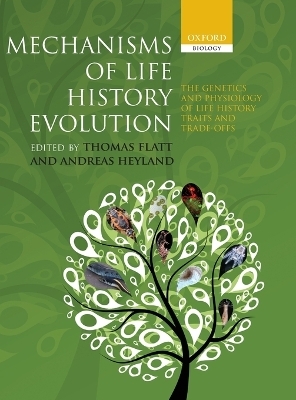
Mechanisms of Life History Evolution
Oxford University Press (Verlag)
978-0-19-956876-5 (ISBN)
Life history theory seeks to explain the evolution of the major features of life cycles by analyzing the ecological factors that shape age-specific schedules of growth, reproduction, and survival and by investigating the trade-offs that constrain the evolution of these traits. Although life history theory has made enormous progress in explaining the diversity of life history strategies among species, it traditionally ignores the underlying proximate mechanisms.
This novel book argues that many fundamental problems in life history evolution, including the nature of trade-offs, can only be fully resolved if we begin to integrate information on developmental, physiological, and genetic mechanisms into the classical life history framework. Each chapter is written by an established or up-and-coming leader in their respective field; they not only represent the state of the art but also offer fresh perspectives for future research. The text is divided into 7 sections that cover basic concepts (Part 1), the mechanisms that affect different parts of the life cycle (growth, development, and maturation; reproduction; and aging and somatic maintenance) (Parts 2-4), life history plasticity (Part 5), life history integration and trade-offs (Part 6), and concludes with a synthesis chapter written by a prominent leader in the field and an editorial postscript (Part 7).
Thomas Flatt has been a Group Leader at the Institute of Population Genetics at University of Veterinary Medicine in Vienna since January 2009. His main research interest is in the biology of aging, life history evolution, and evolutionary physiology. He studied biology at the University of Basel, from where he received his M.Sc. in population biology in 1999, for work supervised by Prof. Stephen C. Stearns (Basel) and Prof. Richard Shine (Sydney). In 2004 he earned his Ph.D. in evolutionary biology from the University of Fribourg (under Prof. Tadeusz Kawecki). Between 2004 and 2008 he was a postdoctoral research fellow in Prof. Marc Tatar's laboratory at Brown University (Providence, USA), sponsored by the Swiss National Science Foundation and the Roche Research Foundation. He is a faculty member of the Vienna Graduate School of Population Genetics (Doktoratskolleg Populationsgenetik). He is also currently serving as a deciding editor for the Journal of Evolutionary Biology. Andreas Heyland is an Assistant Professor at the Department of Integrative Biology at the University of Guelph, Canada. He works primarily on the evolution and development of marine invertebrates. His interest in life history theory began as an undergraduate student in the laboratory of the late Paul I. Ward at the University of Zurich. After completing his MSc at the University of Zurich he continued as a Ph.D. student at the University of Florida in Gainesville, exploring the mechanisms underlying metamorphosis. After a post-doc in Neuroscience he started his faculty position at the University of Guelph in Ontario, Canada where he is an Assistant Professor in the Department of Integrative Biology.
PART 1: INTEGRATING MECHANISMS INTO LIFE HISTORY EVOLUTION ; PART 2: GROWTH, DEVELOPMENT, AND MATURATION ; PART 3: REPRODUCTION ; PART 4: LIFESPAN, AGING AND SOMATIC MAINTENANCE ; PART 5: LIFE HISTORY PLASTICITY ; PART 6: LIFE HISTORY INTEGRATION AND TRADE-OFFS ; PART 7: CONCLUDING REMARKS
| Erscheint lt. Verlag | 12.5.2011 |
|---|---|
| Zusatzinfo | 75 illustrations |
| Verlagsort | Oxford |
| Sprache | englisch |
| Maße | 195 x 248 mm |
| Gewicht | 1274 g |
| Themenwelt | Naturwissenschaften ► Biologie ► Botanik |
| Naturwissenschaften ► Biologie ► Evolution | |
| Naturwissenschaften ► Biologie ► Genetik / Molekularbiologie | |
| Naturwissenschaften ► Biologie ► Zoologie | |
| ISBN-10 | 0-19-956876-6 / 0199568766 |
| ISBN-13 | 978-0-19-956876-5 / 9780199568765 |
| Zustand | Neuware |
| Haben Sie eine Frage zum Produkt? |
aus dem Bereich


